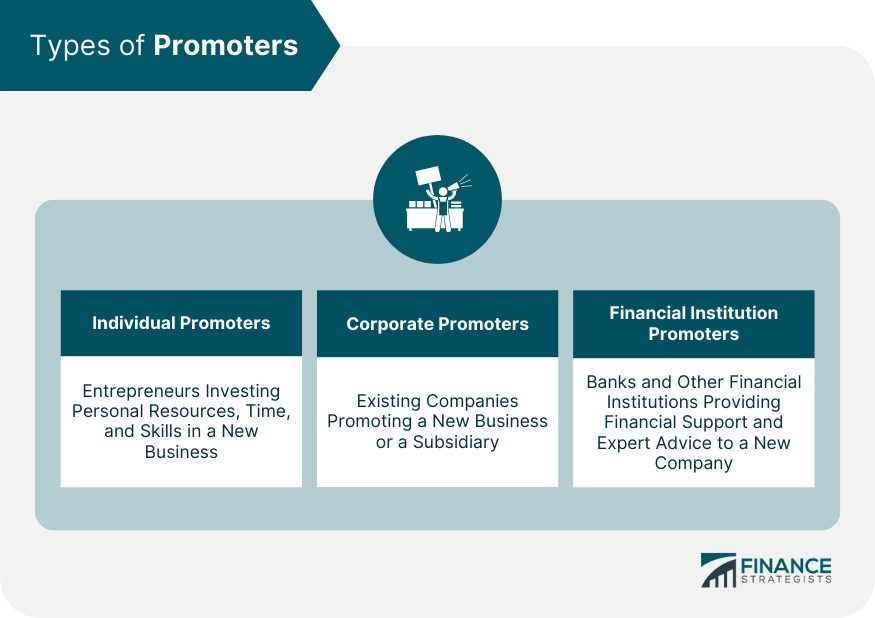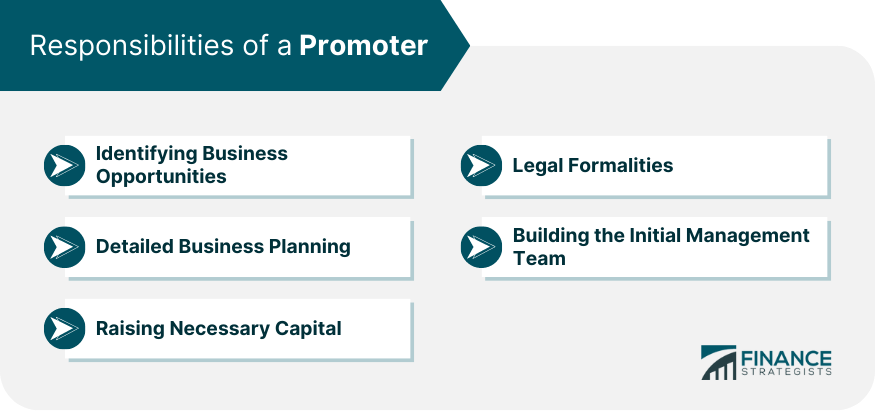A promoter refers to a person, group, or organization that undertakes the preliminary activities involved in the formation of a company. These activities may include conceptualizing the business idea, assembling the team, planning the business model, and raising the necessary capital. The history of this concept traces back to the early days of corporate finance, and it has evolved to encompass a wide range of roles and responsibilities. Today, promoters continue to shape the business landscape by initiating and driving new ventures, fostering innovation, and contributing to economic growth. Individual promoters are those who invest their own resources, time, and skills to establish and run a business. Examples of individual promoters can be found in the startup ecosystem, where innovative entrepreneurs promote their unique business ideas. Corporate promoters are typically existing businesses that play the role of a promoter for a new business or a subsidiary. They usually have a substantial resource pool and vast experience in the industry. Financial institution promoters are entities like banks and financial institutions that help in promoting a company. They provide essential financial support, industry insights, and expert advice, making them invaluable to the inception and growth of a business. The role of a promoter transcends beyond the initial phase of setting up a business. They carry several responsibilities that are crucial to the success of a company. Promoters often identify novel business opportunities and markets that offer the potential for profitability. This involves thorough market research, competitive analysis, and an understanding of customer needs. Promoters are typically involved in the strategic and operational planning of the business. They shape the business model, plan for resource allocation, and formulate marketing and sales strategies. Promoters are instrumental in raising the necessary capital for the business. This includes personal investments, attracting investors, and procuring loans and grants. Promoters take charge of completing all the legal formalities required to start a business. These include incorporation of the company, acquiring necessary licenses, and compliance with laws and regulations. Finally, promoters often recruit the initial management team of the company, ensuring that the business has the necessary human resources to function effectively. Promoters have a unique legal status and enjoy certain rights, yet specific responsibilities and fiduciary duties also bind them. The legal status of promoters varies across jurisdictions. In some countries, promoters are considered company agents, while in others, they may be seen as trustees or even as independent contractors. Promoters are bound by fiduciary duties towards the company and its shareholders. They are expected to act in the company's best interest, avoid conflicts of interest, and uphold the principles of fairness and integrity. Promoters often have significant control over the company, especially in the early stages. They typically retain a substantial share of equity, giving them voting rights and influence over strategic decisions. Despite their essential role, promoters can sometimes engage in actions detrimental to the company and its shareholders. Promoters are legally obliged to disclose any interest they might have in a transaction with the company. Failing to do so could lead to legal liabilities. Promoters are prohibited from making false or misleading statements to attract investors. Any misrepresentation can result in severe legal consequences. Promoters involved in fraudulent activities, like embezzlement of funds or insider trading, can face criminal charges. Legal remedies for promoter misconduct may include compensation to affected parties, removal from the company, and in severe cases, criminal prosecution. An IPO is a significant milestone for many companies, and promoters play a pivotal role in this process. The process of an IPO involves several stages, including planning, preparation of the prospectus, roadshows, book-building, and finally, the listing of the company on a stock exchange. During the pre-IPO planning phase, promoters may need to restructure the company's finances, implement corporate governance practices, and prepare for increased transparency and scrutiny. During the IPO process, promoters often engage in marketing efforts to attract investors. They may also negotiate with underwriters and ensure compliance with regulatory requirements. Following the IPO, promoters may play a significant role in the company's strategic decisions while ensuring adherence to disclosure requirements and managing investor relations. Promoters can profoundly influence a company's corporate governance, both positively and negatively. Promoters can positively influence corporate governance by instilling a strong ethical culture, setting high standards for business conduct, and ensuring transparency and accountability in the company's operations. Conversely, promoters can negatively influence corporate governance if they prioritize personal interests over the company's interests, fail to uphold ethical standards or exercise undue control over the company's decision-making processes. To mitigate the potential negative influence of promoters, companies can implement checks and balances, ensure independent oversight, and foster a culture of transparency and accountability. The role of promoters is continually evolving in response to changes in the business environment, advancements in technology, and regulatory developments. Promoters need to adapt to changing business environments, including shifts in consumer behavior, evolving market dynamics, and increasing competition. Technological advancements can offer new opportunities for promoters but also pose challenges. For instance, digital technologies can facilitate business operations and outreach to investors, but they also require promoters to navigate data privacy and cybersecurity issues. Promoters also need to keep abreast of changes in regulatory frameworks. New regulations may impose additional responsibilities on promoters and require them to ensure their companies' compliance. The evolving landscape presents both opportunities and threats for promoters. Opportunities may arise from emerging markets, innovative business models, and technological advancements. At the same time, promoters face threats from increased competition, regulatory scrutiny, and reputational risks associated with business misconduct. Promoters play an integral role in establishing a business, shaping its strategic direction, and raising the necessary capital. They can be individuals, corporations, or financial institutions, each contributing their unique skills and resources. The role doesn't cease with the inception of the company; promoters carry significant responsibilities throughout the company's life cycle, including the pivotal stage of Initial Public Offerings. Despite the power they hold, they are bound by legal and fiduciary duties, ensuring the company's best interests. Their shareholding signifies the commitment and offers stability but also bears risks if pledged for loans. Promoters can greatly influence corporate governance, and it's vital to mitigate any negative influence through checks, balances, and a culture of transparency. The dynamic business landscape and evolving regulatory frameworks present both opportunities and challenges for promoters, requiring them to continuously adapt and innovate.What Is a Promoter?
Types of Promoters
Individual Promoters
Corporate Promoters
Financial Institution Promoters

Responsibilities of a Promoter
Identifying Business Opportunities
Detailed Business Planning
Raising Necessary Capital
Legal Formalities
Building the Initial Management Team

Legal Status and Rights of Promoters
Status in Various Jurisdictions
Promoter's Fiduciary Duties
Rights of Promoters
Potential Misconduct and Legal Liabilities of Promoters
Disclosure of Interests
Misrepresentation of Prospective Shareholders
Fraudulent Conduct
Legal Remedies and Consequences for Misconduct
Promoter's Role in Initial Public Offerings (IPOs)
Process of IPOs
Role of Promoter in Pre-IPO Planning
Role of Promoter During the IPO Process
Post-IPO Responsibilities of the Promoter
Influence of Promoters on Corporate Governance
Positive Influence of Promoters
Negative Influence of Promoters
Ways to Mitigate Negative Influence
Future Trends and Challenges for Promoters
Impact of Changing Business Environments
Advancements in Technology and Their Influence
Changes in Regulatory Frameworks
Potential Opportunities and Threats for Promoters
Final Thoughts
Promoter FAQs
A promoter plays a crucial role in a company's IPO. They are involved in pre-IPO planning, which may include restructuring the company's finances, preparing for increased transparency, and implementing corporate governance practices. During the IPO process, they engage in marketing efforts to attract investors, negotiate with underwriters, and ensure compliance with regulatory requirements.
Promoter's shareholding signifies their confidence in and commitment to the company, which can positively impact investor confidence and the company's performance. It also provides stability to the company's leadership and strategic direction. However, if promoters pledge their shares as collateral for loans and the company fails to repay, it may lead to a change in control of the company.
Promoters can face legal liabilities for misconduct, such as failing to disclose their interests in a transaction, misrepresenting facts to attract investors, and engaging in fraudulent activities. Consequences can range from compensation to affected parties, removal from the company to criminal prosecution in severe cases.
Yes, a promoter can significantly influence a company's corporate governance. They can positively impact by fostering a strong ethical culture, ensuring transparency and accountability. However, they can also negatively impact by prioritizing personal interests over the company's or exercising undue control over decision-making processes.
Promoters face challenges due to changing business environments, technological advancements, and evolving regulatory frameworks. They need to adapt to shifts in consumer behavior and market dynamics, navigate issues related to data privacy and cybersecurity, and ensure compliance with new regulations. Additionally, they face threats from increased competition and reputational risks associated with business misconduct.
True Tamplin is a published author, public speaker, CEO of UpDigital, and founder of Finance Strategists.
True is a Certified Educator in Personal Finance (CEPF®), author of The Handy Financial Ratios Guide, a member of the Society for Advancing Business Editing and Writing, contributes to his financial education site, Finance Strategists, and has spoken to various financial communities such as the CFA Institute, as well as university students like his Alma mater, Biola University, where he received a bachelor of science in business and data analytics.
To learn more about True, visit his personal website or view his author profiles on Amazon, Nasdaq and Forbes.











